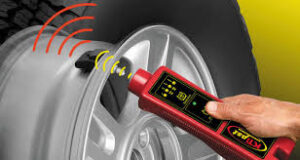Blog
How Long Do TPMS Sensors Last? A Maintenance Guide
How Long Do TPMS Sensors Last? A Maintenance Guide
The Tire Pressure Monitoring System (TPMS) is a vital safety feature in modern vehicles, designed to monitor tire pressure and alert drivers when a tire’s pressure drops below optimal levels. TPMS sensors, which are typically located within the tires or on the valve stem, play a crucial role in ensuring tire health and overall vehicle safety. However, like any automotive component, these sensors don’t last forever, and their longevity is a key consideration for vehicle owners.
In this guide, we’ll explore how long TPMS sensors last, factors affecting their lifespan, and how to maintain them for optimal performance.
What Are TPMS Sensors?
TPMS sensors are electronic devices installed in a vehicle’s tires (or valve stems) to monitor the air pressure within each tire. The sensors transmit data to the vehicle’s onboard system, which alerts the driver when tire pressure falls below a safe threshold. There are two main types of TPMS sensors:
- Direct TPMS Sensors: These sensors measure the actual air pressure in each tire and transmit that data to the vehicle’s computer system. They are the most common and accurate type.
- Indirect TPMS Sensors: These sensors do not measure air pressure directly but instead monitor the tire’s rotational speed via the vehicle’s ABS system. If a tire loses pressure, it will rotate more slowly, triggering an alert.
How Long Do TPMS Sensors Last?
On average, TPMS sensors can last between 5 to 10 years or about 100,000 miles, but this can vary depending on several factors.
Key Factors Affecting TPMS Sensor Lifespan:
- Quality of the Sensor:
- High-quality TPMS sensors from reputable brands typically have a longer lifespan. Sensors made with advanced materials and technology are designed to endure harsher conditions, including fluctuating temperatures and road conditions.
- Cheaper or low-quality sensors may wear out more quickly, leading to malfunctions or failures sooner.
- Environmental Conditions:
- Extreme temperatures, both hot and cold, can affect the lifespan of TPMS sensors. For example, driving in very hot climates or cold regions where snow and ice are common can shorten the life of the sensor.
- Exposure to moisture, road salt (in winter conditions), and other harsh elements can cause corrosion on the sensors or the valve stem, leading to reduced efficiency or failure.
- Driving Habits:
- Frequent driving over rough terrain, potholes, or poorly maintained roads can cause wear and tear on the sensors, leading to early failure.
- Sudden impacts or tire damage, such as punctures or blowouts, can also impact the lifespan of TPMS sensors.
- Battery Life:
- TPMS sensors are powered by batteries, which typically last about 5-7 years. Once the battery begins to degrade, the sensor may stop functioning correctly, resulting in inaccurate readings or a failure to communicate with the vehicle’s TPMS system.
- Some sensors are designed with a non-replaceable battery, meaning the entire sensor will need to be replaced once the battery dies.
Signs That TPMS Sensors Need Replacing
While TPMS sensors are designed to last for years, they do wear out over time. Here are some common signs that your sensors may need replacing:
1. TPMS Warning Light
- If the TPMS warning light on your dashboard stays on or blinks, it could indicate that one or more sensors are malfunctioning or that the tire pressure is too low.
2. Inaccurate Readings
- If your TPMS system shows incorrect pressure readings, it could signal that a sensor is damaged, worn out, or has a dead battery.
3. Frequent Alerts or False Warnings
- If the system constantly alerts you to low tire pressure even after you’ve inflated your tires to the correct level, it might be time to check or replace the sensors.
4. Sensor Failure During Tire Rotation or Replacement
- During tire rotations or replacements, a mechanic may discover that the TPMS sensors are no longer working. In these cases, replacing the faulty sensors during tire service can help restore optimal performance.

How to Maintain Your TPMS Sensors
To ensure the longevity of your TPMS sensors and avoid premature failure, proper maintenance is crucial. Here are some tips for extending the life of your sensors:
1. Regular Tire Inspections
- Inspect your tires for visible damage and ensure that they are properly inflated at least once a month. If your TPMS is malfunctioning, it’s important to check tire pressures manually as well.
2. Avoid Overloading Your Vehicle
- Overloading the vehicle can put excessive strain on your tires and the TPMS sensors, causing them to wear out faster. Always adhere to your vehicle’s recommended weight limits.
3. Proper Tire Inflation
- Keeping your tires at the recommended inflation levels helps reduce the strain on both the tires and the TPMS sensors. Low tire pressure can lead to sensor failure and increased tire wear.
4. Service Your Tires Regularly
- Have your tires rotated regularly, and ask your mechanic to check the condition of your TPMS sensors during routine tire maintenance. This will allow you to spot any issues before they become major problems.
5. Use Protective Covers or Sensors with Corrosion Resistance
- Consider installing protective covers on your tire valves to help prevent corrosion from road salt, moisture, or debris. Some TPMS sensors are built with corrosion-resistant materials, which can help them last longer.

When to Replace TPMS Sensors
While TPMS sensors can last a long time, they will eventually wear out and need to be replaced. Here are some situations when you might need to replace your TPMS sensors:
- Battery Failure: If your TPMS system starts showing a “sensor battery low” warning, it’s time to replace the sensor or the entire valve stem unit.
- Tire Replacement: Whenever you replace your tires, it’s a good idea to have your TPMS sensors checked. If they are near the end of their lifespan, consider replacing them during the tire change to avoid future issues.
- After Accidents or Tire Damage: If you’ve been in an accident or have had a puncture or blowout, it’s important to check your TPMS sensors. Damage to the tire or rim can sometimes damage the sensors, even if the tire appears to be intact.
Conclusion: TPMS Sensors and Longevity
In summary, TPMS sensors are an important safety feature that can last anywhere from 5 to 10 years depending on factors like sensor quality, environmental conditions, and driving habits. Proper maintenance, including regular tire pressure checks, can extend the life of your sensors and ensure they continue to function correctly.
If you notice issues like frequent warning lights, inaccurate readings, or reduced battery life, it’s time to consider replacing your TPMS sensors. Taking proactive steps to maintain your sensors will help ensure that your vehicle remains safe and efficient for years to come.
If you’re unsure about the condition of your TPMS sensors, it’s always a good idea to consult a professional mechanic or tire technician who can inspect the system and replace any faulty sensors as needed.


